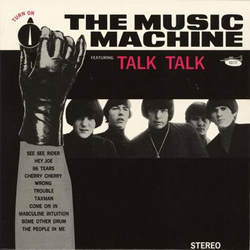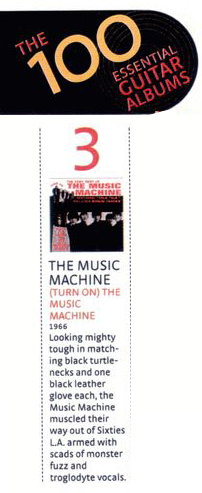TERMS & CONDITIONS | Site by:
Copyright © 2012 Uncle Helmet's Music, LLC. All Rights Reserved.
TRACK LIST
01. Talk Talk
02. Trouble
03. Cherry, Cherry
04. Taxman
05. Some Other Drum
06. Masculine Intuition
07. The People In Me
08. See See Rider
09. Wrong
10. 96 Tears
11. Come On In
12. Hey Joe
COMPOSER
Sean Bonniwell
Sean Bonniwell
Neil Diamond
George Harrison
Sean Bonniwell
Sean Bonniwell
Sean Bonniwell
Ma Rainey
Sean Bonniwell
Rudy Martinez
Sean Bonniwell
Billy Roberts/Willian Roberts
TIME
1:56
2:13
3:10
2:33
2:34
2:08
2:56
2:32
2:18
2:20
2:55
4:13
RELEASE DATE>>
DURATION>>
GENRE>>
STYLES>>
Dec., 31, 1966
29:48
Pop/Rock
Garage Rock
Psychedelic
Garage Punk
PRODUCED BY>> Original Sound
ENGINEER>> N/A
DESCRIPTION>>
- Sean Bonniwell: Composer
- Ron Edgar: Drums
- Mark Landon: Guitar
- Keith Olsen: Bass
- Doug Rhodes: Organ
- Neil Diamond: Composer
- George Harrison: Composer
- Rudy Martinez: Composer
- The Music Machine: Primary Artist
- Ma Rainey: Composer
- Billy Roberts: Composer
- William Roberts: Composer
This album contains all 12 tracks from the Music Machine's 1966 debut album, (Turn On) The Music Machine (Original Sound 5015), including their two chart singles, "Talk Talk" and "The People in Me," plus both sides of both of their third and fourth singles, "Double Yellow Line"/"Absolutely Positive" and "I've Loved You"/"The Eagle Never Hunts the Fly." This is the group's entire output for Original Sound Records; they switched to Warner Bros. in 1967 and changed their personnel and their name to Bonniwell's Music Machine.
Singer/guitarist/songwriter Sean Bonniwell dominates the proceedings with his sonorous voice, whether the band is playing originals like the unforgettable garage rock classic "Talk Talk" or such covers as the Beatles' "Taxman" and fellow garage dwellers ? & the Mysterians' "96 Tears." The playing is rudimentary, but more disciplined than that of many of the rock bands that came into existence in the mid-'60s, and Bonniwell's songwriting is sufficiently varied that it is regrettable the group didn't get much of a chance beyond its initial hit.
30 YEARS LATER>> Guitar Magazine rates The Music Machine's TURN ON album in its top 100 Essential Albums, with a rating of number three in the Garage Rock category.
"I remember driving down Sunset Blvd, punching
the five radio
station presets
and hearing
'Talk Talk' detonating from each one."
- Sean Bonniwell
ALBUM
Discography >>

REVIEW>> by THE RAW SOUNDS OF PROTOPUNK, 01/13/1985
Los Angeles Times, TERRY ATKINSON
Caught up in the swirling excitement of soon-to-peak psychedelia, various American "garage bands"-several from Los Angeles-began to experiment in late '66 and early '67 with a brash, raw sound that would later be termed "protopunk." Among them: Seeds, Standells and Music Machine.
Inspired by English bands like the Yardbirds and the Who, these U.S. outfits discharged what might be called aggressive confusion, swinging their chief weapon-the chain-saw buzz of fuzztone guitar-at enemies both real and imagined. "Talk Talk" was Music Machine 's only big hit, but one that expressed the raging style with a fury exceeded at the time perhaps only by Love's "Seven and Seven Is." The band's subsequent recordings for the Original Sound and Bell labels achieved little more than regional success. There was only one album, "Turn On."
In late '67, members began to drop out, including Olsen, who began a production career that led to albums with Fleetwood Mac and Pat Benatar. Bonniwell kept MM going two more years, then tried a solo turn with little luck. Sound: Psycho-rock at its finest and progenitor of such modern songs as "Institutionalized" by Suicidal Tendencies, "Talk Talk" has a charged-up, manic urgency that still delivers a punch. It's hard to believe that a band able to wax something that powerful faded, but this smart compilation of singles, album cuts and four unreleased tracks shows that Bonniwell was never able to write anything quite comparable. Rockers like "Absolutely Positively" and "The People in Me" skillfully emit neurotic vibes but fall short of the hit's musical drive and vocal tautness. Still, several songs have a semi-naive, garage-psychedelic charm and considerable energy, and the album ends with two unreleased cuts from 1969 that indicate the group was getting the knack for newly evocative, moody material just before it broke up.

REVIEW>> by William Ruhlmann

